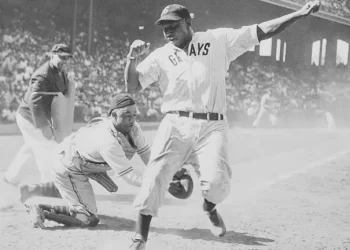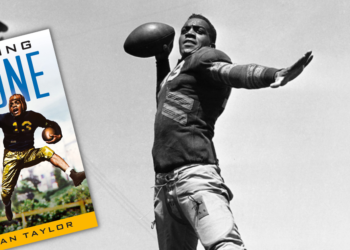By: Zachary Draves
By now most know the story of how Jackie Robinson opened the door for black players in MLB. But some may not know that there were still hurdles in place for those who joined the majors post 1947. In conjunction with LeBron James’s production company Uninterrupted, the History Channel released After Jackie on June 18 to share the legacy of Robinson’s impact as well as highlighting the experiences of black players who followed in his footsteps.
Specifically, the documentary illustrates the journeys of three St. Louis Cardinal players Curt Flood, Bill White, and Bob Gibson. Each of whom brought talent and energy that helped lead the Cardinals into a perennial contender culminating in World Series wins in 1964 and 1967. Along that journey, they experienced racism in various ways .
Their struggle to stardom showcased that even though baseball was integrated it still didn’t root out institutional and individual prejudice. Nobody understood that reality better than Jackie himself. Even though most associate Jackie as being a turn the other cheek type of man in the face of racism, he was anything but that. His post playing years showed him to be an unapologetic black man who wasn’t the least bit shy in combating injustice. He went to rallies, raised funds for civil rights organizations, and eventually called out MLB for a lack of black representation in its managerial positions.
Flood, White, and Gibson followed in his footsteps and played their part in the Civil Rights Movement in their own way.
“As a storyteller, it is telling the stories of unsung heroes,” director Andre Gaines told NBS.” What these guys showed us is that you can do your part. If you can do something within your sport or organization and make a difference, that adds up to universal change.
Certainly Jackie was all that and then some but so was Curt Flood.
In 1969, he refused to accept a trade from the Cardinals to the Philadelphia Phillies under the Reserve Clause, a rule that gave the owners ultimate authority over a player’s future. They had the power to bound players to a single team and/or trade them without the players input. Flood famously referred to himself as a “well paid slave” and took his case all the way to the Supreme Court. The baseball world completly shunned him with the exception of Hank Greenburg, Bill Veeck, and Jackie Robinson himself. Even though he lost the case in a 5-3 decision, he helped pave the way for free agency.
The documentary also features Ken Griffey Jr., CC Sabathia, and Mookie Betts reflecting on the impact these players had on their careers. Furthermore, it highlights the explosion of black talent in baseball from the 1970’s-1990s.
In the present day when we are coming to terms with the legacy of race and racism in America, baseball, much like the game itself, has been slow to catch up. According to the Institute for Diversity and Ethics in Sport, black players only constitute 7.2 percent of current MLB players. Dusty Baker and Dave Roberts are the only current black managers. During the summer of 2020 after the murder of George Floyd and the protests that followed, MLB was woefully behind other professional leagues in taking action.
“Baseball, and all sports, are often a reflection of larger society. While society has made progress, we absolutely have so much more we need to change” said Jimmy Spencer, general manager of Uninterrupted in an email interview.
After Jackie helps us to navigate through the treacherous waters of history and recognize how it applies to the present day. Given the recent rise in athlete activism this documentary contextualizes the influence athletes can have in effecting social change however big or small.

(Courtesy: Youtube)


 NFL
NFL





